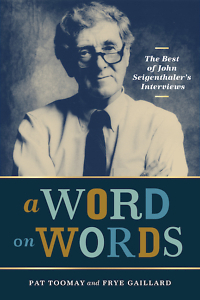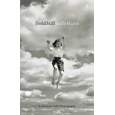A Breath of Fresh Air
John Seigenthaler promoted thoughtful discourse one book at a time
A Word on Words: The Best of John Seigenthaler’s Interviews celebrates the significant contribution to the American literary landscape made by Nashville native John Seigenthaler. For more than 40 years, Seigenthaler hosted A Word on Words, a 30-minute program broadcast weekly on Nashville’s public television station in which he interviewed leading authors of the day. Seigenthaler died in 2014, and two of his guests, Pat Toomay and Frye Gaillard, “in awe of his extraordinary life,” have joined forces to edit a book sampling 24 of his most insightful and entertaining interviews.
 In his introduction, Gaillard calls Seigenthaler “a lover of the craft — of journalism, of writing, of people who care about justice and truth.” Seigenthaler began his journalism career at The Tennessean in 1949, ultimately serving as editor, publisher, and chairman during his long tenure there. In 1961 he was asked to join the Kennedy administration under Attorney General Robert Kennedy. In May of that year, while attempting to shield Freedom Riders under his protection in Montgomery, Alabama, he suffered broken ribs and a fractured skull. His response after the fact: “I am only a footnote to history. I shed my blood that day by accident.”
In his introduction, Gaillard calls Seigenthaler “a lover of the craft — of journalism, of writing, of people who care about justice and truth.” Seigenthaler began his journalism career at The Tennessean in 1949, ultimately serving as editor, publisher, and chairman during his long tenure there. In 1961 he was asked to join the Kennedy administration under Attorney General Robert Kennedy. In May of that year, while attempting to shield Freedom Riders under his protection in Montgomery, Alabama, he suffered broken ribs and a fractured skull. His response after the fact: “I am only a footnote to history. I shed my blood that day by accident.”
After his brief time in politics, Seigenthaler returned to The Tennessean and would go on to serve as the first editorial director of USA Today and president of the American Society of Newspaper Editors. In 1991, he founded the First Amendment Center at Vanderbilt University.

Seigenthaler began hosting A Word on Words in 1972. A master interviewer, adept at placing his guests’ personal experiences into the larger social and historical context of the day, he was known for being a quick study who somehow managed to read every word of every book prior to the discussion. His erudition and in-depth understanding of the subject matter definitely show in the transcripts compiled here.
The book is divided into five sections: “Civil Rights,” “Literature,” “Music,” “Sports,” and “The Presidency.” The civil rights material is perhaps the strongest, being a subject obviously dear to Seigenthaler’s heart, and establishes a theme that continues throughout the book. In this section he speaks with national icon John Lewis about his memoir, Walking with the Wind, and the concept of nonviolent protest. “The only thing we had were our bodies,” Lewis says. “And we had to present our bodies as living witnesses to the truth.”
Author John Egerton, whose award-winning Speak Now Against the Day chronicles earlier unsung civil rights heroes, refers to “this Southern thing that we all carry around with us in great bags and burdens on our shoulders.” And renowned journalist David Halberstam shares firsthand stories of the young people whose courage and suffering led to the passing of the 1964 Civil Rights Act and the 1965 Voting Rights Act. Halberstam calls it “an astonishing accomplishment in five years.”

For Seigenthaler, race relations are never far from any conversation about life in the South, or in the U.S., for that matter, whether the topic is literature, music, or even sports. Novelist Alice Randall suggests that dismissing Gone with the Wind as simply a romance novel “sugarcoats a political perspective that is based on Black intellectual inferiority.” Music legend Waylon Jennings talks about overcoming racial prejudice in his own life: “It’s something I grew up around. … And that’s a hateful thing about being raised in the South.” Researcher William Marshall says that Jackie Robinson’s breaking of the color barrier “transcends baseball. … [Robinson] was carrying an entire race on his shoulders.”
In the final section of the book, Seigenthaler hosts thoughtful discussions with Pulitzer Prize winners Jon Meacham (on Thomas Jefferson), Doris Kearns Goodwin (on Abraham Lincoln), and David Maraniss (on Barack Obama). But a true highlight of the book for longtime fans is the last entry: an interview with Seigenthaler himself by his son, John Seigenthaler Jr., who tells his dad, “Well, for many years, people have come up to me and said how much they’ve enjoyed the program. … the windows that you’ve opened in their lives have let in a breath of fresh air, all through books.” And what could be a finer legacy than that?

Tina Chambers has worked as a technical editor at an engineering firm and as an editorial assistant at Peachtree Publishers, where she worked on books by Erskine Caldwell, Will Campbell, and Ferrol Sams, to name a few. She lives in Chattanooga.


